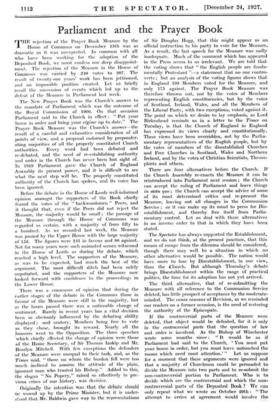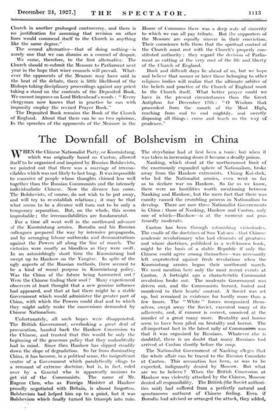Parliament and the Prayer Book
THE rejection of the Prayer Book Measure by the House of Commons on December 15th was as dramatic as it was unexpected. In common with all who have been working for the adoption of the Deposited Book, we must confess our deep disappoint- ment. The rejection of the Measure in the House of Commons was carried by 240 votes to 207. The result of twenty-one years' work has been jettisoned, and an impossible position created. Let us briefly recall the succession of events which led up to the defeat of the Measure in Parliament last week.
The New Prayer Book was the Church's answer to the mandate of Parliament which was the outcome of the Royal Commission of 1906. On that occasion Parliament said to the Church in effect : "Put your house in order and bring your regime up to date." The Prayer Book Measure was the Church's answer—the result of a careful and exhaustive consideration of all points of view, and a proposal endorsed by preponder- ating majorities of all the properly constituted Church authorities. Every word had been debated and re-debated, and the need of re-establishing authority and order in the Church has never been lost sight of. In 1919 Parliament gave the Church of England Assembly its present power, and it is difficult to see what the next step will be. The properly constituted authority of the Church has spoken, and its voice has been ignored.
Before the debate in the House of Lords well-informed opinion amongst the supporters of the Book chiefly feared the votes of the " backwoodsmen " Peers, and it thought that, even if the Peers did not reject the Measure, the majority would be small ; the passage of the Measure through the House of Commons was regarded as certain, with a majority of from fifty to a hundred. As we recorded last week, the Measure was passed by the Upper House with the large majority of 153. The figures were 241 in favour and 88 against. Not for many years were such animated scenes witnessed in the House of Lords as during the debate, which reached a high level. The supporters of the Measure, as was to be expected, had much the best of the argument. The most difficult ditch had been safely negotiated, and the supporters of the Measure now looked forward with confidence to the proceeding; in the Lower House.
There was a consensus of opinion that during the earlier stages of the debate in the Commons those in favour of the Measure were still in the majority, but as the hours passed there was a noticeable change of sentiment. Rarely in recent years has a vital decision been so obviously influenced by the debating ability displayed ; and oratory, Members being free to vote as they chose, brought its reward. Nearly all the honours went to the Opposition. The three speeches which chiefly tffected the change of opinion were those Of the Home Secretary, of Sir Thomas Inskip and Mr. Rosslyn Mitchell. With few exceptions the defenders of the Measure were unequal to their task, and, as the Times said "those on whom the burden fell were too much inclined to assume the attitude of the plain, ignorant man who trusted his Bishop." Added to this, the slogan "No Popery," raised so effectively in pre- vious crises of our history, was decisive.
Originally the intention was that the debate should ne wound up by the Prime Minister, but it is under- stood that Mr. Baldwin gave way to the representations of Sir Douglas Hogg, that this might appear as an official instruction to his party to vote for the Measure.
As a result, the last speech for the Measure was sadly inadequate. Much of the comment which has appeared in the Press seems to us irrelevant. We are told that the voting shows that "the English people are funda- mentally Protestant "—a statement that no one contro- verts; but an analysis of the voting figures shows that in England 199 Members voted for the Measure, and only 175 against. The Prayer Book Measure was therefore thrown out, not by the votes of Members representing English constituencies, but by the votes of Scotland, Ireland, Wales, and all the Members of the Liberal Party, with two exceptions, voted against it. The point on which we desire to lay emphasis, as Lord Birkenhead reminds us in a letter to the Times on Tuesday, is that the Church of England in England has expressed its views clearly and constitutionally. These views have been overridden, not by the Parlia- mentary representatives of the English people, but by the votes of members of the disestablished Churches and Free Churches in Scotland, Wales and Northern Ireland, and by the votes of Christian Scientists, Theoso- phists and others.
There are four alternatives before the Church. If the Church Assembly re-enacts the Measure it can be reintroduced into Parliament next session ; the Church can accept the ruling of Parliament and leave things in :Wu quo ; the Church can accept the advice of some of its most determined critics and re-present the Measure, leaving out all changes in the Communion Service ; or it can make up its mind to press for Dis- establishment, and thereby free itself from Parlia- mentary control. Let us deal with these alternatives in an inverse order to that in which they have been stated.
The Spectator has always supported the Establishment, and we do not think, at the present juncture, that this means of escape from the dilemma should be considered, though there may well be a situation in which no other alternative would be possible. The nation would have more to lose by Disestablishment, in our view, than the Church. But although Thursday's debate brings Disestablishment within the range of practical polities, the time for its adoption has not yet arrived.
The third alternative, that of re-submitting the Measure with all reference to the Communion Service deleted, has little prospect of acceptance by the moderate- minded. The causa causans of Revision, as we reminded our readers on a former occasion, is the need of restoring the authority of the Episcopate.
If the controversial parts of the Measure were deleted, that object would be defeated, for it is only in the controversial parts that the question of law and order is involved. As the Bishop of Winchester wrote some months since : "It would be as if Parliament had said to the Church, You must put your house in order, but you must leave untouched the rooms which need most attention.'" Let us suppose for a moment that these arguments were ignored and that a majority of Churchmen could be persuaded to divide the Measure into two parts and to re-submit the non-controversial portion to Parliament. Who is to decide which are the controversial and which the non. controversial, parts of the Deposited Book ? We can only repeat what we wrote on October 29th: "The attempt to arrive at agreement would involve the Church in another prolonged controversy, and there is no justification for assuming that revision on other lines would commend itself to the Church in anything like the same degree."
The second alternative—that of doing nothing—is surely one that we can dismiss as a counsel of despair.
We come, therefore, to the first alternative. The Church should re-submit the Measure to Parliament next year in the hope that wiser counsels will prevail. What- ever the opponents of the Measure may have said in the heat of the debate, there is little likelihood of the Bishops taking disciplinary proceedings against any priest taking a stand on the contents of the Deposited Book. We cannot improve on Lord Birkenhead's words : "Every clergyman now knows that in practice he can with impunity employ the revised Prayer Book."
The Deposited Book remains the Book of the Church of England. About that there can be no two opinions. In the speeches of the opponents of the Measure in the House of Commons there was a deep n-ite of sincerity to which we can all pay tribute. But the supporters of. the Measure are equally sincere in their conviction. Their conscience tells them that the spiritual control of the Church must rest with the Church's properly con- stituted authority ; they regard the decision of Parlia- ment as cutting at the very root of the life and liberty of the Church of England.
Dark and difficult days lie ahead of us, but we hope and believe that sooner or later those belonging to other religious bodies will realize that the ultimate arbiter of the beliefs and practice of the Church of England must be the Church itself. What better prayer could we have in the present circumstances than the Great Antiphon for December 17th: 0 Wisdom that proceedest from the mouth of the Most High, reaching from end to end mightily, and sweetly disposing all things : come and teach us the way of prudence."































 Previous page
Previous page